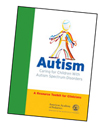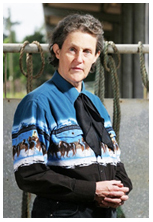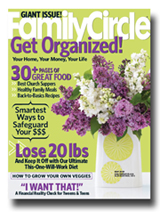by Beth Finke
A story on Forbes.com quotes Easter Seals’ good friend Joanne Gruszkos, director of MassMutual’s Special Care Program. The story points out that while one of the most critical decisions facing parents of children with autism is choosing who should assume the role of guardian when they are no longer able to care for their children, the question of guardianship often gets lost in the shuffle.
“Naming a guardian is an important decision for any child with special needs, but especially for children with autism who may have difficulty communicating their own wants and needs,” added Gruszkos.
To help with the process of identifying and naming a guardian, MassMutual developed a list of 10 questions parents can ask themselves.
1. Have you directly and openly discussed the issue with the adult whom you intend to name as guardian? Often, parents become so busy with day-to-day care of their child with special needs that future planning understandably takes a backseat. But failing to have an open discussion with your child’s prospective guardian could create disarray exactly when your child needs continuity.
2. Have you considered all your children — not just the eldest — as potential guardians to ensure you choose the one that is best-suited for the role? Often, parents simply assume that the oldest sibling will assume the role of guardian without discussing the possibility openly. Lack of candor can lead to serious complications. At a crucial time, a sibling might decline to take on the role or be ill-prepared to assume his or her duties. Additionally, other siblings might be temperamentally better-suited to assume the role of guardian.
3. Does the guardian you are naming live in the same state or in close proximity to your child with special needs? Living nearby can be important. The prospective guardian can begin to familiarize himself or herself with the daily needs of the child with special needs and to be involved in decisions that might affect both the child and the future guardian.
4. Is the guardian whom you are naming aware of the specifics of the day-to-day care and routine of your child with special needs? Do you have an outline describing this care in detail, and have you given time for the potential guardian to review it? Providing a would-be guardian with an outline of daily needs and activities can help him or her understand the scope of responsibilities. Additionally, the outline can help the future guardian determine the resources needed to provide this day-to-day care. Request a free Letter of Intent template on CD at Mass Mutual’s Web site.
5. Is the guardian whom you are naming at a time and place in his or her own life to successfully assume the role aware of changes in care that may be required over time for your child with special needs? A prospective guardian who is going through a life challenge — for example, a divorce or the birth of his or her own child — might be ill-equipped to take on the added challenge of guardianship. Moreover, the guardian must be made aware that the needs of the child with special needs could change over time, and that the guardian will need to be able to take on different or additional responsibilities in response.
6. Have you and/or the potential guardian considered the impact or strain the responsibilities of being a guardian may have on his or her marriage and family life? A prospective guardian might have the best intentions at heart, but might not recognize that assuming responsibility for a child with special needs could put stress on his or her own family life.
7. Have you considered the impact or strain the responsibility of being a guardian may have on the finances of the potential guardian? Caring for a child with special needs can be emotionally and financially demanding. An Easter Seals/MassMutual survey of families with children having autism found that more than half say caring for their child drains the family’s current financial resources (compared to 13 percent of parents of typically-developing children) and that 74 percent fear their children will not have enough financial support after they die, compared to only 18 percent of parents of typically-developing children. With specialized planning, families can address financial considerations and ease possible future financial problems.
8. Have you considered naming two guardians — one for the personal care of your child with special needs and one with responsibility for personal property? If a prospective guardian seems ill-suited to caring for both a child’s personal and financial needs, it’s possible to name two guardians to split the duties and ease the workload of each. A family member may be well-suited to carry out the child’s day-to-day care, and an impartial corporate trustee may be responsible for financial matters such as the safekeeping and management of the assets in a special needs trust, periodic trust accountings and accurate tax reporting and filing of tax returns.
9. Have you considered naming a guardian who is not a member of your family (e.g. a friend or institution) who/which might be better equipped to provide care for your child with special needs? Sometimes, the best guardian is not a member of the family but a non-family member or institution that is better equipped — experientially, emotionally and/or financially — to take on the job. Family members can still play important roles in the child’s care while knowing that the child’s guardianship is firmly established and professionally handled by this third party.
10. Have you considered naming a successor guardian if the guardian whom you name is unable to assume responsibility? Unforeseen circumstances can prevent your first choice as guardian from assuming his or her duties. If so, it’s important to have a back-up choice in place, including a potential corporate trustee, who is fully aware of what will be expected and is willing to assume those esponsibilities.
More information and resources are available on the autism page on MassMutual’s web site. For more details on the survey referenced in #7 of the MassMutual list above, download the Easter Seals Living with Autism Study results and key findings.
 Remember my blog post about Easter Seals Crossroads delivering important autism resources to local pediatricians? On April 1st we conducted a mass distribution which reached 150 doctors in one day, and we are continuing to distribute autism resource toolkits.
Remember my blog post about Easter Seals Crossroads delivering important autism resources to local pediatricians? On April 1st we conducted a mass distribution which reached 150 doctors in one day, and we are continuing to distribute autism resource toolkits. 







 I am pleased to introduce
I am pleased to introduce 
